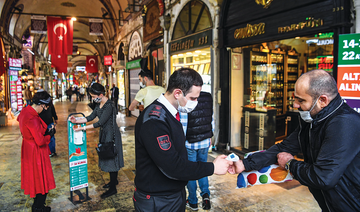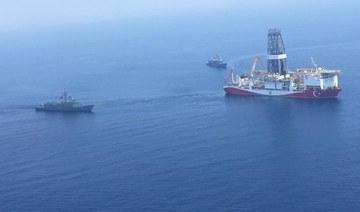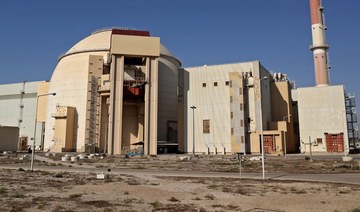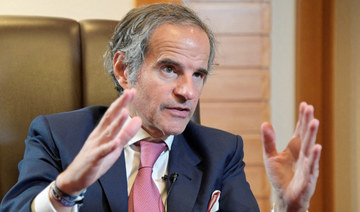ISTANBUL: Turkey will suspend research for oil and gas exploration in disputed waters in the Eastern Mediterranean that abruptly raised military tensions with neighboring Greece, a top Turkish official said Tuesday.
President Recep Tayyip Erdogan told his aides to “be constructive and put this on hold for some time,” presidential spokesman Ibrahim Kalin told Turkish broadcaster CNN Turk.
Last week, Turkey announced plans to dispatch research vessel Oruc Reis and two support ships to carry out operations through Aug. 2 south of the Greek islands of Rhodes, Karpathos and Kastellorizo. The declaration angered Greece and prompted criticism by the United States, France and other European countries.
NATO allies Greece and Turkey are at odds over drilling rights in the Eastern Mediterranean.
Turkey has accused Greece of trying to exclude it from the benefits of potential oil and gas finds in the Aegean Sea and Eastern Mediterranean, arguing that sea boundaries for commercial exploitation should be divided between the Greek and Turkish mainlands and not include the Greek islands on an equal basis. Athens counters that Turkey’s position is a violation of international law.
“Everyone should continue working on their own continental shelves and conduct joint work in contested areas,” Kalin said. He also said that bilateral issues with Greece should be solved through dialogue rather than through threats on Turkey’s bid for European Union membership.
On Monday, Greek government spokesman Stelios Petsas said Turkey was withdrawing navy vessels from the area, adding that Athens remained ready to enter negotiations with Turkey “within the framework of international law and good neighborly relations.”
The two historic regional rivals have come close to war three times since the early 1970s, including over offshore exploitation rights, ownership of an uninhabited Aegean Sea islet. The most serious confrontation was in 1974, when Turkey invaded the Eastern Mediterranean island nation of Cyprus, following an abortive coup by supporters of union with Greece.
Turkey to suspend research in waters disputed with Greece
https://arab.news/p46cq
Turkey to suspend research in waters disputed with Greece
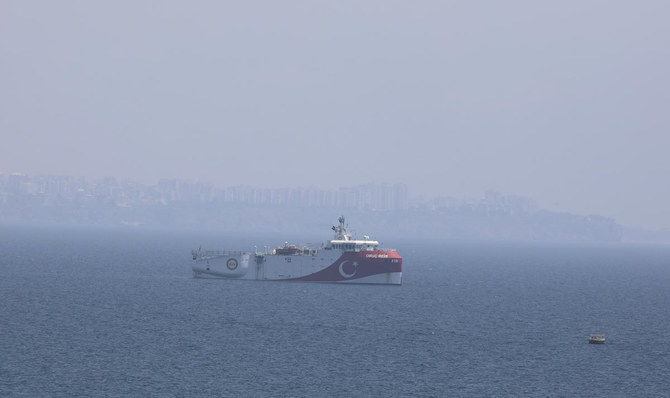
- President Recep Tayyip Erdogan told his aides to “be constructive and put this on hold for some time”
- NATO allies Greece and Turkey are at odds over drilling rights in the Eastern Mediterranean
IAEA chief Grossi to visit Iran May 6-8, Mehr says
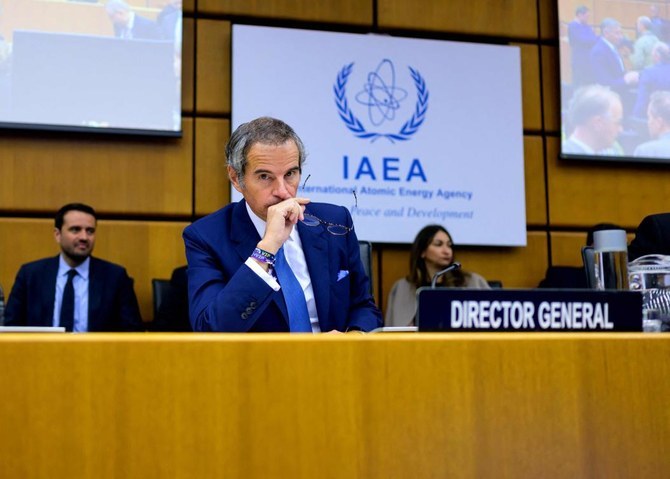
- Grossi will meet Iranian officials in Tehran before participating in the International Conference of Nuclear Sciences and Technologies held in Isfahan
- Enrichment to 60 percent brings uranium close to weapons grade
DUBAI: International Atomic Energy Agency chief Rafael Grossi is scheduled to visit Iran to take part in a nuclear conference from May 6-8 and meet Iranian officials, Iran’s Mehr news agency said on Tuesday.
“Grossi will meet Iranian officials in Tehran before participating in the International Conference of Nuclear Sciences and Technologies held in Isfahan,” the agency reported.
The IAEA chief said in February that he was planning a visit to Tehran to tackle a “drifting apart” in relations between the agency and the Islamic Republic.
Grossi said the same month that while the pace of uranium enrichment by Iran had slowed slightly since the end of last year, Iran was still enriching at an elevated rate of around 7 kg of uranium per month to 60 percent purity.
Enrichment to 60 percent brings uranium close to weapons grade, and is not necessary for commercial use in nuclear power production. Iran denies seeking nuclear weapons but no other state has enriched to that level without producing them.
Under a defunct 2015 agreement with world powers, Iran can enrich uranium only to 3.67 percent. After then-President Donald Trump pulled the United States out of that deal in 2018 and re-imposed sanctions, Iran moved well beyond the deal’s nuclear restrictions.
The IAEA said the 2015 nuclear deal was “all but disintegrated.”
‘We are with them’: Lebanon students rally for Gaza
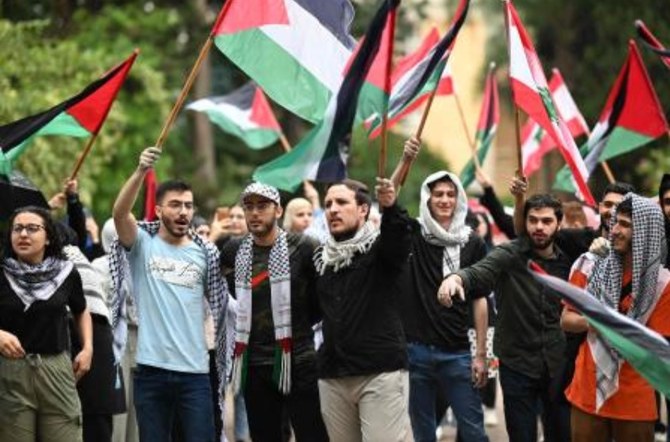
- “We are Palestine’s neighbors. If we do not stand with them today, who will?” asked AUB student Zeina
- Some students also carried banners declaring solidarity with south Lebanon, where Israel and Hamas-ally Hezbollah have exchanged near-daily cross-border fire since October
BEIRUT: Hundreds of university students in Lebanon protested on Tuesday against Israel’s bombardment of Gaza, inspired by recent pro-Palestinian demonstrations that have rocked US and European campuses, AFP correspondents said.
Dozens of students gathered at the prestigious American University of Beirut (AUB), some wearing the traditional Arab keffiyeh scarf that has long been a symbol of the Palestinian cause, an AFP photographer said.
“We are Palestine’s neighbors. If we do not stand with them today, who will?” asked AUB student Zeina, 23, declining to provide her surname.
“Around the world, students my age, from our generation, are the ones raising their voices,” she added.
The Gaza war began after Palestinian militant group Hamas’s unprecedented October 7 attacks on southern Israel, which resulted in the deaths of 1,170 people, mostly civilians, according to an AFP tally of Israeli official figures.
Hamas also took some 250 hostages. Israel estimates that 129 remain in Gaza, including 34 believed to be dead.
Israel’s retaliatory offensive, aimed at destroying Hamas, has killed at least 34,535 people in Gaza, mostly women and children, according to the health ministry in the Hamas-run territory.
The protests came as Hamas said it was considering a plan for a 40-day ceasefire and the release of scores of hostages in exchange for larger numbers of Palestinian prisoners.
Some students also carried banners declaring solidarity with south Lebanon, where Israel and Hamas-ally Hezbollah have exchanged near-daily cross-border fire since October.
The protests came as similar demonstrations swept universities across the United States, posing a challenge to administrators trying to balance free speech with complaints that the rallies have veered into anti-Semitism.
Footage of police in riot gear called in by universities to break up the rallies has circulated worldwide, recalling the protest movement that erupted during the Vietnam War.
“We renew our demand to stop the American-backed Israeli genocide against Palestinians and urgently demand to stop Zionist (Israeli) attacks” on south Lebanon, a female student told the crowd at AUB, praising “the global student movement supporting our people.”
At the nearby Lebanese American University, dozens of students gathered, raising Palestinian flags and burning an Israeli one.
“We want to convey a message to our people in Gaza: we are with them... We have not forgotten them,” Lara Qassem, 18, told AFP.
In Lebanon, at least 385 people have been killed in months of cross-border violence, mostly fighters but also including 73 civilians, according to an AFP tally.
Israel says 11 soldiers and nine civilians have been killed in the country’s north.
Arab-European ministerial statement: We endorse efforts toward achieving a Gaza ceasefire
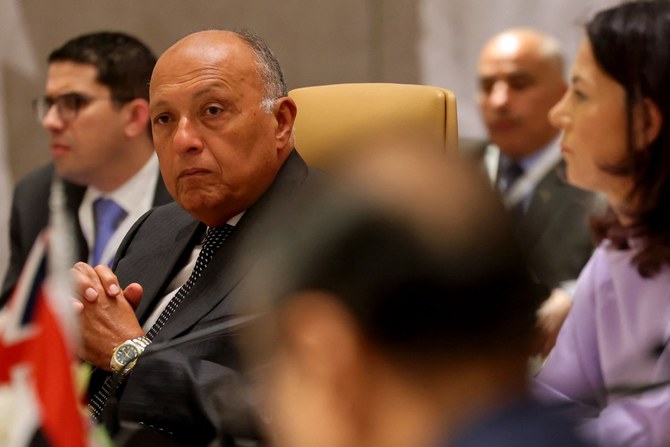
RIYADH: A joint statement from Arab and European foreign ministers highlighted critical priorities in addressing the ongoing conflict in Gaza, following a meeting in Saudi Arabia's capital, Riyadh, on Tuesday.
The statmenet called for the urgent need to halt all unilateral violations in Palestinian territories. It also called for the release of prisoners and hostages, putting an end to the war in Gaza and all illegal unilateral actions and violations in the occupied Palestinian territories, including East Jerusalem.
The meeting was chaired by Saudi Minister of Foreign Affairs Prince Faisal bin Farhan and Norwegian Foreign Minister Espen Barth Eide.
It was also attended by foreign ministers and representatives from Bahrain, Portugal, the European Union, Algeria, Jordan, Germany, the United Arab Emirates, Spain, Ireland, Italy, Belgium, Turkey, the Arab League, Slovenia, France, Palestine, Qatar, Egypt, and the United Kingdom.
Ministers reiterated their support for efforts aimed at achieving a ceasefire in Gaza. They emphasized the importance of establishing a unified Palestinian government in both the West Bank and Gaza.
Recognizing the significance of internal unity among Palestinians, the ministers have called for concerted efforts to overcome divisions and work towards a common goal of self-governance and statehood.
The statement also called for adopting a reliable and irreversible path towards implementing the two-state solution.
Arab and European foreign ministers were gathered in Riyadh on the sidelines of a two-day World Economic Forum special meeting.
Israel police say Turk shot dead after stabbing officer in Jerusalem
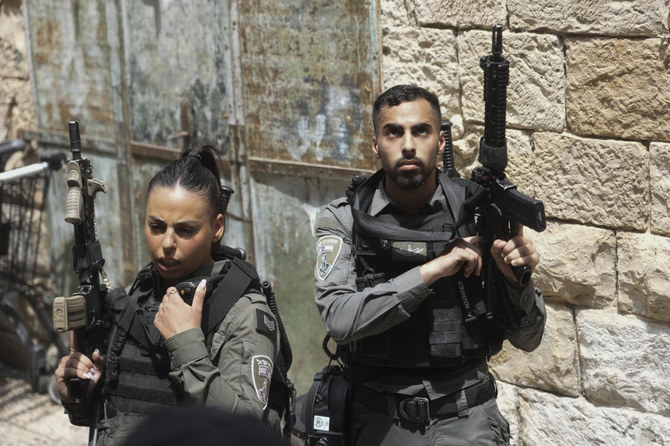
JERUSALEM: A Turkish national stabbed and moderately wounded an Israeli police officer in annexed east Jerusalem before being shot dead on Tuesday, police said.
Police said that a “terrorist armed with a knife arrived in the Old City of Jerusalem, on the Herod’s Gate Ascent street, charged at a border police officer and stabbed him with a knife.”
It said another officer at the scene “neutralized the terrorist” and the attacker was later pronounced dead.
Netanyahu vows to invade Rafah ‘with or without a deal’ as ceasefire talks with Hamas continue
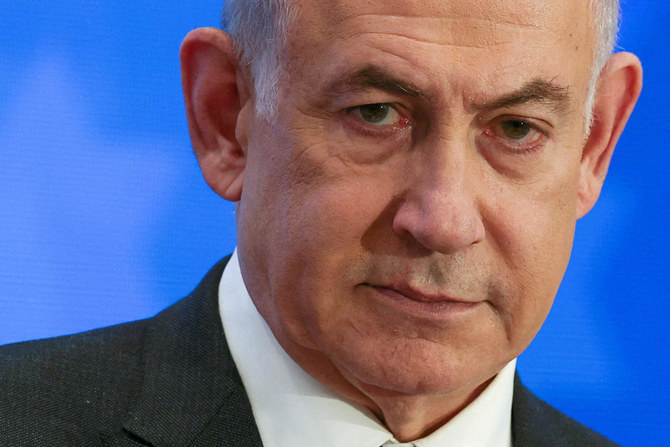
- Netanyahu said Israel would enter Rafah to destroy Hamas’ battalions there “with or without a deal”
- The international community have raised an alarm over the the fate of civilians in Rafah
TEL AVIV: Israeli Prime Minister Benjamin Netanyahu pledged Tuesday to launch an incursion into the southern Gaza city of Rafah, where hundreds of thousands of Palestinians are sheltering from the almost 7-month-long war, as ceasefire negotiations between Israel and Hamas appear to be gaining steam.
Netanyahu’s comments came hours before US Secretary of State Antony Blinken arrives in Israel to advance the truce talks — which appear to be one of the most serious rounds of negotiations between Israel and Hamas since the war began. The deal is meant to free hostages, bring some relief to the population and avert an Israeli offensive into Rafah and the potential harm to civilians there.
Speaking to a group of bereaved families and one organization representing families of hostages held by militants, Netanyahu said Israel would enter Rafah to destroy Hamas’ battalions there regardless of whether a truce-for-hostages deal was struck or not.
“The idea that we will stop the war before achieving all of its goals is out of the question,” Netanyahu said, according to a statement from his office. “We will enter Rafah and we will eliminate Hamas’ battalions there — with or without a deal, to achieve the total victory.”
Netanyahu has faced pressure from his nationalist governing partners not to proceed with a deal that might prevent Israel from invading Rafah, which it says is Hamas’ last major stronghold. His government could be threatened if he agrees to a deal because hard-line Cabinet members have demanded an attack on Rafah.
But with more than half of Gaza’s 2.3 million people sheltering there, the international community, including Israel’ top ally the US, has warned Israel against any offensive that puts civilians at risk.
It was not clear if Netanyahu’s comments were meant to appease his governing partners or whether they would have any bearing on any emerging deal with Hamas.
Netanyahu was addressing the Tikva Forum, a small group of families of hostages that’s distinct from the main group representing the families of captive Israelis that has indicated it prefers to see Hamas crushed over the freedom of their loved ones. Families and their supporters have demonstrated in the thousands every week for a deal that would bring the hostages home, saying it should take precedence over military action.
The current deal being discussed, brokered by the US, Egypt and Qatar, would see the release of dozens of hostages in exchange for a six-week halt in fighting as part of an initial phase, according to an Egyptian official and Israeli media. Hundreds of Palestinian prisoners held by Israel would also be released.
But a sticking point remains over what happens next. Hamas has demanded assurances that an eventual release of all hostages will bring a complete end to Israel’s nearly seven-month assault in Gaza and a withdrawal of its troops from the devastated territory. Israel has offered only an extended pause, vowing to resume its offensive once the first phase of the deal is over. The issue has repeatedly obstructed efforts by the mediators during months of talks.
Netanyahu has repeatedly rejected stopping the war in return for hostage releases, and says an offensive on Rafah is crucial to destroying the militants.
The Israel-Hamas war was sparked by the unprecedented Oct. 7 raid into southern Israel in which militants killed around 1,200 people, mostly civilians, and abducted around 250 hostages. Israel says the militants are still holding around 100 hostages and the remains of more than 30 others.
The war in Gaza has killed more than 34,000 Palestinians, according to local health officials. The war has driven around 80 percent of Gaza’s population of 2.3 million from their homes, caused vast destruction in several towns and cities, and pushed northern Gaza to the brink of famine.



